The science behind our recipes.
50% of dogs over the age of 10 are diagnosed with cancer. Using the latest research in canine oncology and nutrition, Leaps is here to lengthen and strengthen your dog’s life with a science-backed diet.
What is cancer?
Healthy cells grow and multiply as the body needs them.
But occasionally this process breaks down, and cells develop mutations that cause them to grow and multiply when they shouldn't. These mutations may be inherited, or they may develop over time as genes suffer damage or wear out.
Cancer occurs when these abnormal cells multiply and reproduce uncontrollably and exponentially. As they spread and crowd out normal cells, it becomes harder for the body to function properly.
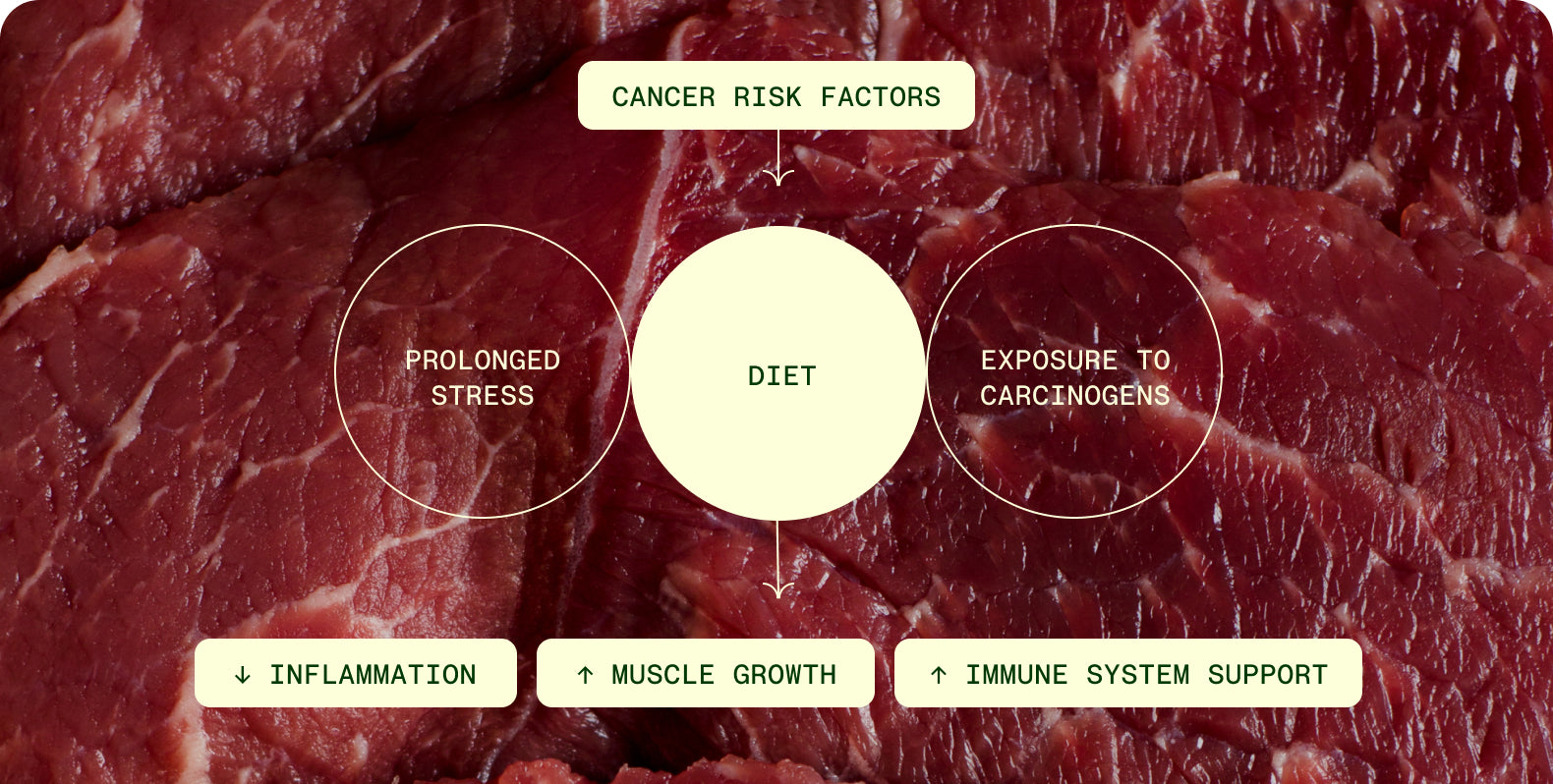
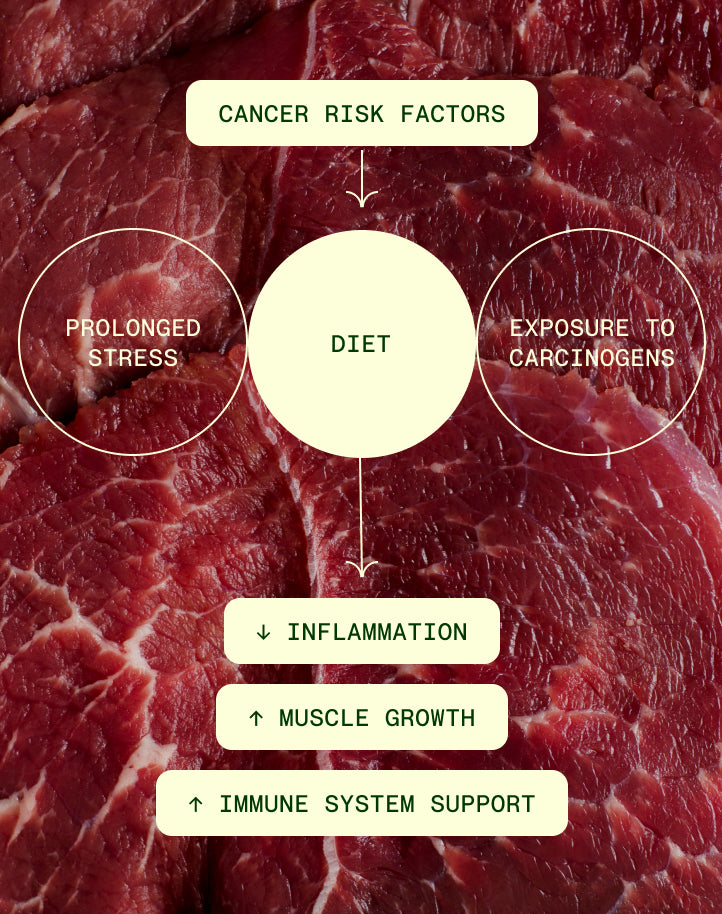
Leaps focuses on what we can control—diet.
While genetics play a role in a dog's risk of developing cancer, environmental factors like prolonged stress, exposure to carcinogens, and diet play even bigger one. Leaps focuses on what your dog eats, which can profoundly impact cancer risk, cancer outcomes, and overall health.
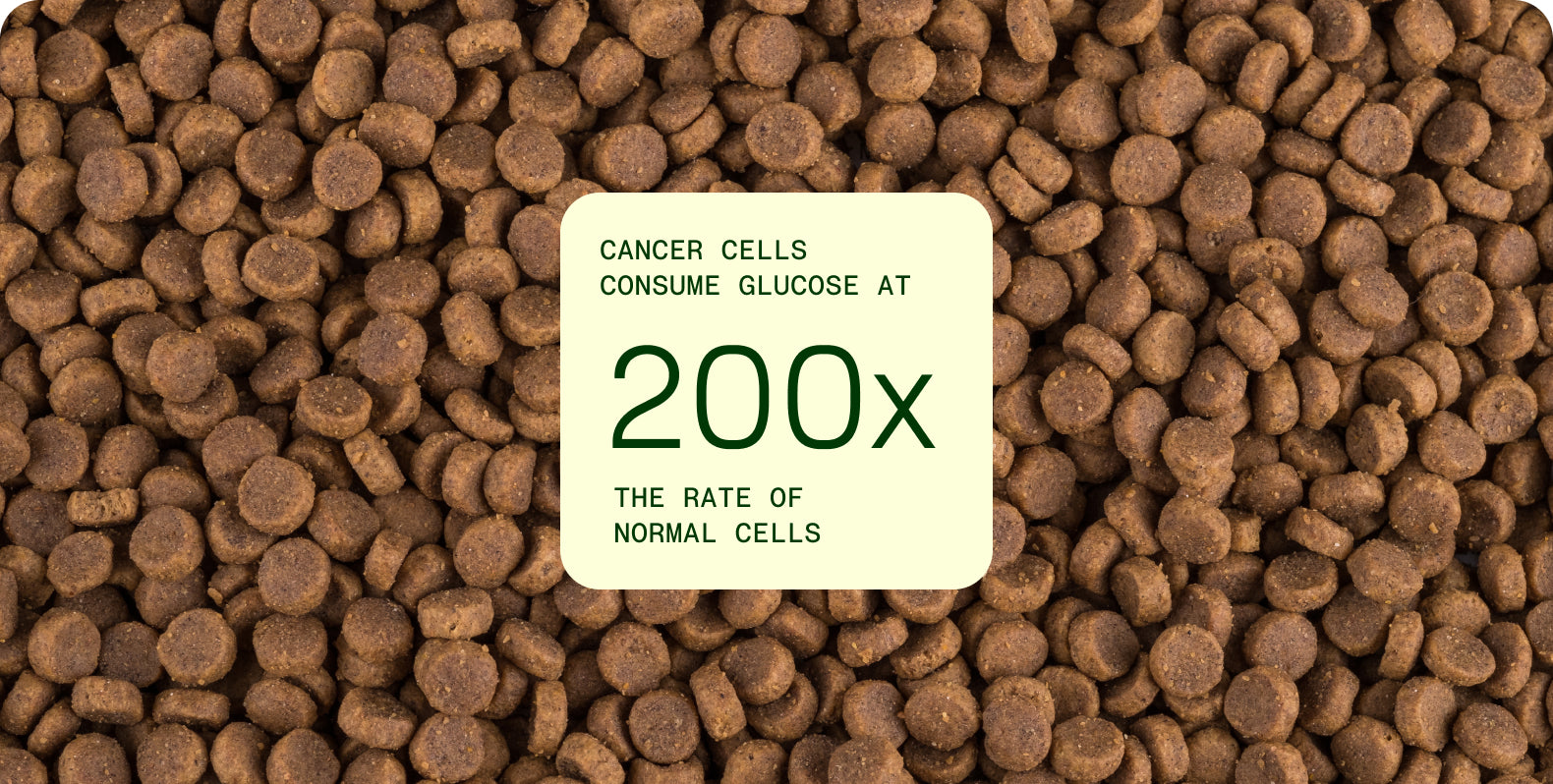
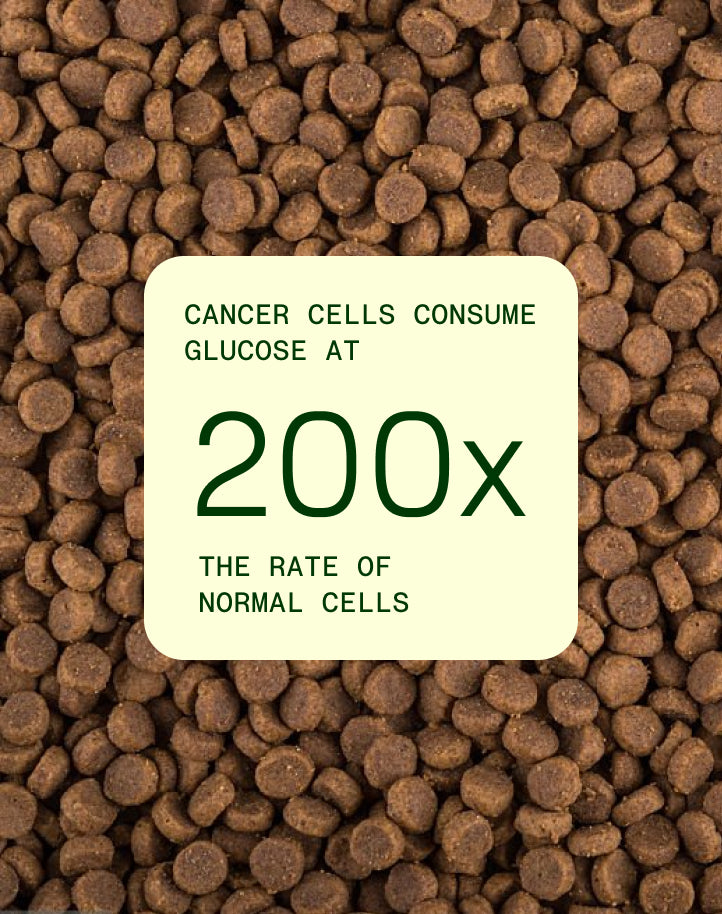
Food can speed—or slow—the spread of cancer.
Carbs break down into glucose, the easiest energy source for cancer cells to use. Leaps' recipes keep carbs low while increasing the amount of high-quality protein and healthy fats to reduce inflammation, boost muscle growth, and support the immune system - all key in helping your dog fight cancer.
At Leaps, the fight starts in the bowl.
The Leaps Difference
Cancer causes dramatic, permanent metabolic changes in dogs. The nutrients they do (or don’t) receive profoundly impact their health—affecting their weight, appetite, digestion, energy and immune system.
Leaps is low in cancer-feeding carbs
Carbohydrates (which break down into glucose) aren’t a natural or necessary part of any dog’s diet. That’s why experts agree that carbohydrates shouldn’t exceed 20-25% of a dog’s diet. Still, most commercial dog food brands—including leading fresh brands—contain 30%-70% carbs. And they’re typically using higher-glycemic carb fillers like corn, wheat, rice and potatoes, which provide zero nutritional value, and spike blood sugar (particularly problematic for dogs with cancer).
At Leaps, we limit the amount of excess glucose available to cancer cells while providing enough energy for healthy cells to thrive. Our recipes are made with healthy, complex carbohydrates derived from whole foods like vegetables—which break down much slower than simple carbohydrates—and with a much higher percentage of high-quality protein and fat.
Experts agree that carbs should not exceed 20%-25% of a healthy dog's daily diet.
For dogs with cancer, carb intake should be even lower and simple carbs should be eliminated entirely.
Leaps is high in the right fats
Cancer struggles to use fat as an energy source (fat = good!). But not all fats are created equal. Omega 6 fatty acids support brain and bone health and regulate metabolism, but they also can increase inflammation, which can degrade the immune system and promote tumor development. Omega 3s reduce inflammation and have been shown to help prevent and slow cancer development.
Leaps delivers a balanced ratio of Omega 6:3 and includes a healthy dose of EPA and DHA, the two most efficient and essential Omega 3s due to their higher bioavailability.
A healthy Omega 6:3 ratio is under 5:1, and ideally closer to 1:1.
However, AAFCO standards allow an astronomically high ratio of up to 30:1, and most commercial diets don't disclose these numbers because they’re often 10:1 or higher — dangerously high ratios for dogs with cancer.
Leaps is high in the protein your dog needs—and wants to eat
As carnivores, dogs naturally gravitate to protein-rich diets. Protein is essential for muscle growth and repair, and without it, dogs will suffer from muscle degradation, weight loss, weakened immune systems, poor gastrointestinal function, and slower wound healing.
Consuming enough protein can be difficult for dogs with cancer, however, as cancer consumes protein at the expense of healthy cells. On top of this, not all proteins are created equal (grain-fed beef provides fewer nutrients than grass-fed beef, for example) and unfortunately most other brands use the lower-quality options—even when they tout them as "human-grade."
At Leaps, we deliver not only a healthy quantity of protein, but also higher-quality protein—maximizing nutritional value and ease of absorption to help counteract the damaging effects of cancer.
Feed-grade protein is bad. But not all "human-grade" protein is created equal.
Leaps is made from whole, organic ingredients — no filler or synthetics
Fillers like corn, wheat, rice, and potatoes offer zero nutritional value for dogs, yet even the leading fresh dog food brands use them because they're cheap—allowing them to deliver enough calories without having to invest in more nutritious ingredients. These brands also rely on synthetic vitamin mixes to meet nutritional minimums—because they’re cheaper than delivering them through whole foods. But this is problematic for dogs with cancer because synthetic vitamins are harder to absorb than natural ones.
At Leaps, we build our recipes around whole ingredients and avoid using fillers or synthetics. When we add supplements, we only choose natural ones that deliver critical benefits for dogs living with cancer —like choline and seaweed calcium to support lipid metabolism, liver health, muscle control, cognitive function, and bone strength.
Whole food sources maximize nutritional value.
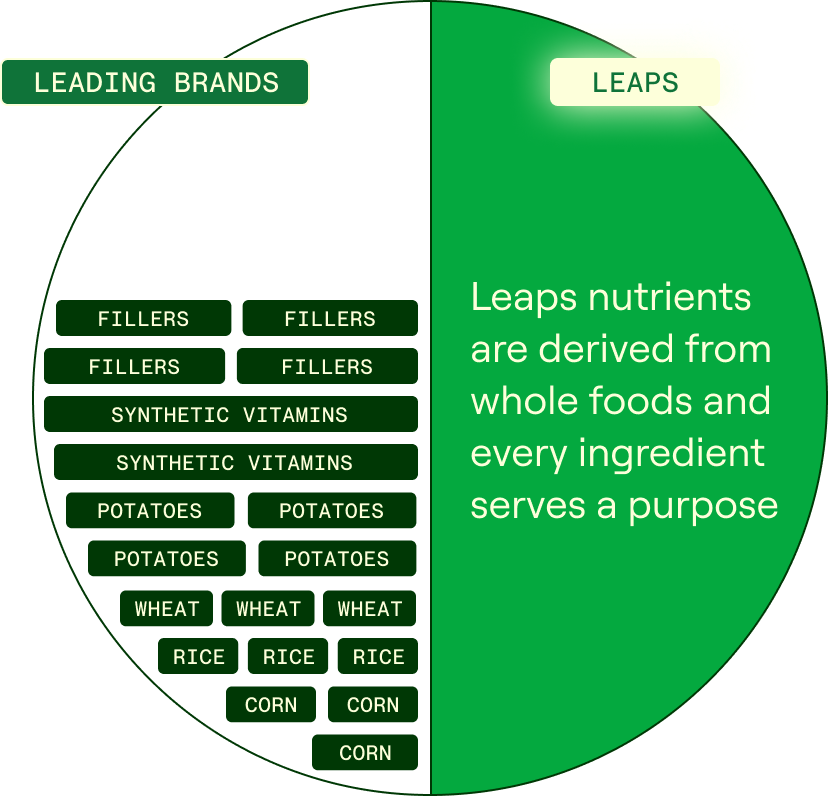
Leaps is gently cooked at low temperatures
Kibble is ultra-processed which is bad for all dogs, but particularly bad for dogs with cancer. High-temperature cooking degrades nutritional value and denatures protein. It also can leave behind AGEs (Advanced Glycation End Products) and ALEs (Advanced Lipoxidation End Products)—both known carcinogens.
Raw food is unprocessed, but can be difficult for some dogs to digest and poses a higher risk of bacterial infection. This is especially dangerous for dogs with cancer, who tend to have compromised immune systems.
Leaps is gently cooked at lower heat for longer—delivering safe and easy-to–digest meals without compromising nutritional quality.
Cooking method can greatly impact the nutritional value and safety of dog food.
Carbs
Leaps is low in cancer-feeding carbs
Carbohydrates (which break down into glucose) aren’t a natural or necessary part of any dog’s diet. That’s why experts agree that carbohydrates shouldn’t exceed 20-25% of a dog’s diet. Still, most commercial dog food brands—including leading fresh brands—contain 30%-70% carbs. And they’re typically using higher-glycemic carb fillers like corn, wheat, rice and potatoes, which provide zero nutritional value, and spike blood sugar (particularly problematic for dogs with cancer).
At Leaps, we limit the amount of excess glucose available to cancer cells while providing enough energy for healthy cells to thrive. Our recipes are made with healthy, complex carbohydrates derived from whole foods like vegetables—which break down much slower than simple carbohydrates—and with a much higher percentage of high-quality protein and fat.
Experts agree that carbs should not exceed 20%-25% of a healthy dog's daily diet.
For dogs with cancer, carb intake should be even lower and simple carbs should be eliminated entirely.
Fats
Leaps is high in the right fats

Cancer struggles to use fat as an energy source (fat = good!). But not all fats are created equal. Omega 6 fatty acids support brain and bone health and regulate metabolism, but they also can increase inflammation, which can degrade the immune system and promote tumor development. Omega 3s reduce inflammation and have been shown to help prevent and slow cancer development.
Leaps delivers a balanced ratio of Omega 6:3 and includes a healthy dose of EPA and DHA, the two most efficient and essential Omega 3s due to their higher bioavailability.
A healthy Omega 6:3 ratio is under 5:1, and ideally closer to 1:1.
However, AAFCO standards allow an astronomically high ratio of up to 30:1, and most commercial diets don't disclose these numbers because they’re often 10:1 or higher — dangerously high ratios for dogs with cancer.
Proteins
Leaps is high in the protein your dog needs—and wants to eat
As carnivores, dogs naturally gravitate to protein-rich diets. Protein is essential for muscle growth and repair, and without it, dogs will suffer from muscle degradation, weight loss, weakened immune systems, poor gastrointestinal function, and slower wound healing.
Consuming enough protein can be difficult for dogs with cancer, however, as cancer consumes protein at the expense of healthy cells. On top of this, not all proteins are created equal (grain-fed beef provides fewer nutrients than grass-fed beef, for example) and unfortunately most other brands use the lower-quality options—even when they tout them as "human-grade."
At Leaps, we deliver not only a healthy quantity of protein, but also higher-quality protein—maximizing nutritional value and ease of absorption to help counteract the damaging effects of cancer.
Feed-grade protein is bad. But not all "human-grade" protein is created equal.
Nutrients
Leaps is made from whole, organic ingredients — no filler or synthetics
Fillers like corn, wheat, rice, and potatoes offer zero nutritional value for dogs, yet even the leading fresh dog food brands use them because they're cheap—allowing them to deliver enough calories without having to invest in more nutritious ingredients. These brands also rely on synthetic vitamin mixes to meet nutritional minimums—because they’re cheaper than delivering them through whole foods. But this is problematic for dogs with cancer because synthetic vitamins are harder to absorb than natural ones.
At Leaps, we build our recipes around whole ingredients and avoid using fillers or synthetics. When we add supplements, we only choose natural ones that deliver critical benefits for dogs living with cancer —like choline and seaweed calcium to support lipid metabolism, liver health, muscle control, cognitive function, and bone strength.
Whole food sources maximize nutritional value.
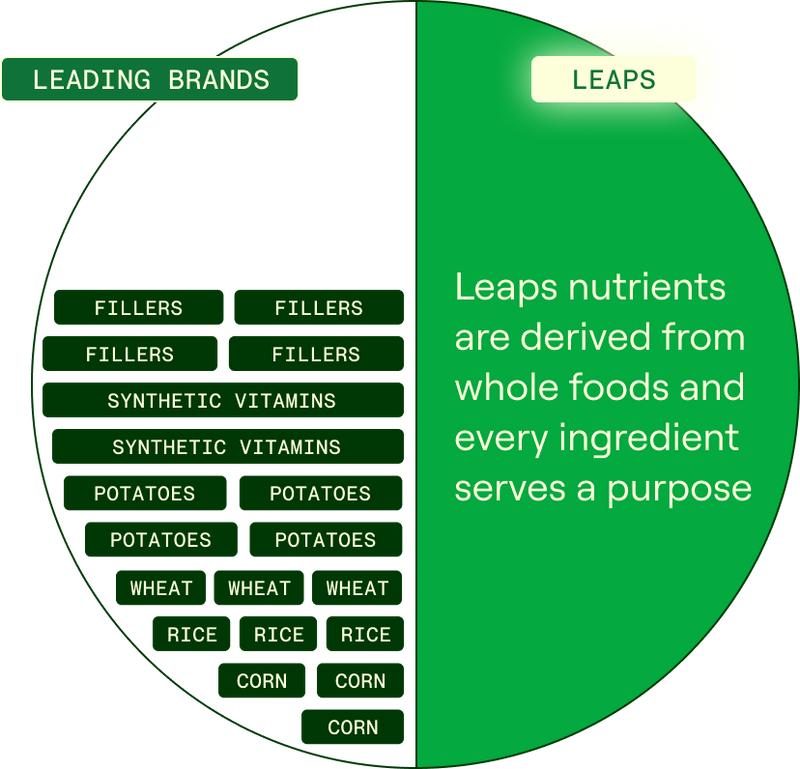
Processing
Leaps is gently cooked at low temperatures
Kibble is ultra-processed which is bad for all dogs, but particularly bad for dogs with cancer. High-temperature cooking degrades nutritional value and denatures protein. It also can leave behind AGEs (Advanced Glycation End Products) and ALEs (Advanced Lipoxidation End Products)—both known carcinogens.
Raw food is unprocessed, but can be difficult for some dogs to digest and poses a higher risk of bacterial infection. This is especially dangerous for dogs with cancer, who tend to have compromised immune systems.
Leaps is gently cooked at lower heat for longer—delivering safe and easy-to–digest meals without compromising nutritional quality.
Cooking method can greatly impact the nutritional value and safety of dog food.
The Science of Our Recipes
Every ingredient has a purpose.
-

Beef
- Highly bioavailable protein source to boost muscle growth and energy
- Contains high iron levels, vital for red blood cells
-

Beef Heart
- Nutrient-dense protein source to boost muscle growth and energy
- Rich in B vitamins that support heart health and immune function
-

Crimini Mushrooms
- Vitamin D supports immune function and reduces inflammation
- Contains CLA, which has demonstrated anti-cancer effects in animal studies.
-

Pollock
- Lean protein source to boost muscle growth and energy
- Rich in anti-inflammatory Omega 3s
-

Beef Kidney
- Rich in B vitamins that support brain health and red blood cell formation
- Contains high iron levels, vital for red blood cells
-

Beef Liver
- Contains high iron levels, vital for red blood cells
- Vitamin A supports immune function
-

Maitake Mushrooms
- Vitamin D supports immune function and reduces inflammation
- Beta glucans exert anti-cancer effects by stimulating the immune system to kill cancer cells
-

Collards
- Increased consumption of leafy greens like collards has been shown to reduce cancer risk in dogs
- Calcium and Vitamin K support bone health
-

Spinach
- Healthy vitamins and minerals including carotenoids support immune function and eye health
- Increased consumption of leafy greens like spinach has been shown to reduce cancer risk in dogs
-

Pumpkin
- Carotenoids like beta-carotene help protect against cell damage
- Packed with fiber to regulate metabolism and settle upset stomachs
- Vitamins A, C, and E support immune function
-

Oysters
- Rich in anti-inflammatory Omega 3s
- High in antioxidant vitamins and minerals
-

Apples
- Contain antiangiogenic molecules that block the growth of blood vessels that support tumor growth
- Vitamins A, C, and K support immune function and boost energy
-

Chia Seeds
- Rich in anti-inflammatory Omega 3s and antioxidants
- High in fiber for healthy digestion
- Magnesium, phosphorus, calcium, and potassium support bone health
-

Cranberries
- Vitamins C and K support immune function
- Contain anti-cancer polyphenols and antioxidants
-

Wheat Germ Oil
- Great source of natural Vitamin E, a powerful antioxidant that protects dogs from free radical damage
- Rich in anti-inflammatory Omega 3s
-

Hempseed Oil
- Arginine boosts the immune system
- Rich in anti-inflammatory Omega 3s
- Gamma-linolenic acid boosts energy and regulates metabolism
-

Seaweed Calcium
- Packed with essential vitamins, minerals, and nutrients
- Great source of calcium to support bone health
-

Ginger
- Studies demonstrate anti-cancer effects
- Filled with anti-inflammatory compounds
- Relieves nausea to help mitigate side effects of cancer treatments
-

Nutritional Yeast
- Rich in B vitamins that support immune function, brain health, and metabolism
- Beta glucans exert anti-cancer effects by stimulating the immune system to kill cancer cells
-

Himalayan Salt
- Aids in nutrient absorption
- High in minerals like iron, zinc, magnesium, potassium, and calcium
- Combats sodium deficiency, which is more common in cancer patients
-

Turkey
- Lean protein source to boost muscle growth and energy
- Rich in B vitamins that support brain health and red blood cell formation
-

Pollock
- Lean protein source to boost muscle growth and energy
- Rich in anti-inflammatory Omega 3s
-

Butternut Squash
- Carotenoids like beta-carotene help protect against cell damage
- Packed with fiber to regulate metabolism and settle upset stomachs
-

Bison Liver
- Contains high iron levels, vital for red blood cells
- Vitamin A supports immune function
-

Oysters
- Rich in anti-inflammatory Omega 3s
- High in antioxidant vitamins and minerals
-

Coconut Meat
- High in antioxidant vitamins and minerals
- Contains lauric acid, which has anti-microbial, anti-fungal, and anti-viral properties
-

Maitake Mushrooms
- Vitamin D supports immune function and reduces inflammation
- Beta glucans exert anti-cancer effects by stimulating the immune system to kill cancer cells
-

Chia Seeds
- Rich in anti-inflammatory Omega 3s and antioxidants
- High in fiber for healthy digestion
- Magnesium, phosphorus, calcium, and potassium support bone health
-

Blueberries
- Vitamins C and K support immune function
- Contain anti-cancer polyphenols and antioxidants
-

Spirulina
- Rich in anti-inflammatory Omega 3s
- Contains phycocyanin, a powerful antioxidant
-

Eggshell Powder
- Great source of calcium to promote bone health
- Chondroitin sulfate and glucosamine help ease joint pain and stiffness
-

Wheat Germ Oil
- Great source of natural Vitamin E, a powerful antioxidant that protects dogs from free radical damage
- Rich in anti-inflammatory Omega 3s
-

Nutritional Yeast
- Rich in B vitamins that support immune function, brain health, and metabolism
- Beta glucans exert anti-cancer effects by stimulating the immune system to kill cancer cells
-

Kelp
- Contains 60 different minerals and vitamins and 21 amino acids
- Good source of fiber to regulate metabolism and settle upset stomachs
-

Choline
- Supports brain and heart health as well as liver and muscle function
-

Cloves
- Contains eugenol, which has been shown to enhance apoptosis in cancer cells and inhibit cancer cell proliferation
- Carotenoids like beta-carotene help protect against cell damage
-

Vitamin E
- A natural antioxidant that protects against free radical damage
-

Pollock
- Lean protein source to boost muscle growth and energy
- Rich in anti-inflammatory Omega 3s
-

Sardines
- Lean protein source to boost muscle growth and energy
- Rich in anti-inflammatory Omega 3s
- Vitamin D supports immune function and reduces inflammation
-

Kale
- Contains antioxidant carotenoids lutein and zeaxanthin, which have shown anti-cancer effects
- Vitamins A, C, and K support immune function and boost energy
-

Bison Liver
- Contains high iron levels, vital for red blood cells
- Vitamin A supports immune function
-

Coconut Meat
- High in antioxidant vitamins and minerals
- Contains lauric acid, which has anti-microbial, anti-fungal, and anti-viral properties
-

Oysters
- Rich in anti-inflammatory Omega 3s
- High in antioxidant vitamins and minerals
-

Zucchini
- Packed with fiber to regulate metabolism and settle upset stomachs
- Vitamins A, C, and K support immune function and boost energy
-

Maitake Mushrooms
- Vitamin D supports immune function and reduces inflammation
- Beta glucans exert anti-cancer effects by stimulating the immune system to kill cancer cells
-

Nutritional Yeast
- Rich in B vitamins that support immune function, brain health, and metabolism
- Beta glucans exert anti-cancer effects by stimulating the immune system to kill cancer cells
-

Spirulina
- Rich in anti-inflammatory Omega 3s
- Contains phycocyanin, a powerful antioxidant
-

Wheat Germ Oil
- Great source of natural Vitamin E, a powerful antioxidant that protects dogs from free radical damage
- Rich in anti-inflammatory Omega 3s
-

Eggshell Powder
- Great source of calcium to promote bone health
- Chondroitin sulfate and glucosamine help ease joint pain and stiffness
-

Kelp
- Contains 60 different minerals and vitamins and 21 amino acids
- Good source of fiber to regulate metabolism and settle upset stomachs
-

Ginger
- Studies demonstrate anti-cancer effects
- Filled with anti-inflammatory compounds
- Relieves nausea to help mitigate side effects of cancer treatments
-

Cloves
- Contains eugenol, which has been shown to enhance apoptosis in cancer cells and inhibit cancer cell proliferation
- Carotenoids like beta-carotene help protect against cell damage
-

Choline
- Supports brain and heart health as well as liver and muscle function
-

Hempseed Oil
- Arginine boosts the immune system
- Rich in anti-inflammatory Omega 3s
- Gamma-linolenic acid boosts energy and regulates metabolism
-

Vitamin E
- A natural antioxidant that protects against free radical damage
-

Beef
- Highly bioavailable protein source to boost muscle growth and energy
- Contains high iron levels, vital for red blood cells
-

Beef Heart
- Nutrient-dense protein source to boost muscle growth and energy
- Rich in B vitamins that support heart health and immune function
-

Crimini Mushrooms
- Vitamin D supports immune function and reduces inflammation
- Contains CLA, which has demonstrated anti-cancer effects in animal studies.
-

Pollock
- Lean protein source to boost muscle growth and energy
- Rich in anti-inflammatory Omega 3s
-

Beef Kidney
- Rich in B vitamins that support brain health and red blood cell formation
- Contains high iron levels, vital for red blood cells
-

Beef Liver
- Contains high iron levels, vital for red blood cells
- Vitamin A supports immune function
-

Maitake Mushrooms
- Vitamin D supports immune function and reduces inflammation
- Beta glucans exert anti-cancer effects by stimulating the immune system to kill cancer cells
-

Collards
- Increased consumption of leafy greens like collards has been shown to reduce cancer risk in dogs
- Calcium and Vitamin K support bone health
-

Spinach
- Healthy vitamins and minerals including carotenoids support immune function and eye health
- Increased consumption of leafy greens like spinach has been shown to reduce cancer risk in dogs
-

Pumpkin
- Carotenoids like beta-carotene help protect against cell damage
- Packed with fiber to regulate metabolism and settle upset stomachs
- Vitamins A, C, and E support immune function
-

Oysters
- Rich in anti-inflammatory Omega 3s
- High in antioxidant vitamins and minerals
-

Apples
- Contain antiangiogenic molecules that block the growth of blood vessels that support tumor growth
- Vitamins A, C, and K support immune function and boost energy
-

Chia Seeds
- Rich in anti-inflammatory Omega 3s and antioxidants
- High in fiber for healthy digestion
- Magnesium, phosphorus, calcium, and potassium support bone health
-

Cranberries
- Vitamins C and K support immune function
- Contain anti-cancer polyphenols and antioxidants
-

Wheat Germ Oil
- Great source of natural Vitamin E, a powerful antioxidant that protects dogs from free radical damage
- Rich in anti-inflammatory Omega 3s
-

Hempseed Oil
- Arginine boosts the immune system
- Rich in anti-inflammatory Omega 3s
- Gamma-linolenic acid boosts energy and regulates metabolism
-

Seaweed Calcium
- Packed with essential vitamins, minerals, and nutrients
- Great source of calcium to support bone health
-

Ginger
- Studies demonstrate anti-cancer effects
- Filled with anti-inflammatory compounds
- Relieves nausea to help mitigate side effects of cancer treatments
-

Nutritional Yeast
- Rich in B vitamins that support immune function, brain health, and metabolism
- Beta glucans exert anti-cancer effects by stimulating the immune system to kill cancer cells
-

Himalayan Salt
- Aids in nutrient absorption
- High in minerals like iron, zinc, magnesium, potassium, and calcium
- Combats sodium deficiency, which is more common in cancer patients
-

Turkey
- Lean protein source to boost muscle growth and energy
- Rich in B vitamins that support brain health and red blood cell formation
-

Pollock
- Lean protein source to boost muscle growth and energy
- Rich in anti-inflammatory Omega 3s
-

Butternut Squash
- Carotenoids like beta-carotene help protect against cell damage
- Packed with fiber to regulate metabolism and settle upset stomachs
-

Bison Liver
- Contains high iron levels, vital for red blood cells
- Vitamin A supports immune function
-

Oysters
- Rich in anti-inflammatory Omega 3s
- High in antioxidant vitamins and minerals
-

Coconut Meat
- High in antioxidant vitamins and minerals
- Contains lauric acid, which has anti-microbial, anti-fungal, and anti-viral properties
-

Maitake Mushrooms
- Vitamin D supports immune function and reduces inflammation
- Beta glucans exert anti-cancer effects by stimulating the immune system to kill cancer cells
-

Chia Seeds
- Rich in anti-inflammatory Omega 3s and antioxidants
- High in fiber for healthy digestion
- Magnesium, phosphorus, calcium, and potassium support bone health
-

Blueberries
- Vitamins C and K support immune function
- Contain anti-cancer polyphenols and antioxidants
-

Spirulina
- Rich in anti-inflammatory Omega 3s
- Contains phycocyanin, a powerful antioxidant
-

Eggshell Powder
- Great source of calcium to promote bone health
- Chondroitin sulfate and glucosamine help ease joint pain and stiffness
-

Wheat Germ Oil
- Great source of natural Vitamin E, a powerful antioxidant that protects dogs from free radical damage
- Rich in anti-inflammatory Omega 3s
-

Nutritional Yeast
- Rich in B vitamins that support immune function, brain health, and metabolism
- Beta glucans exert anti-cancer effects by stimulating the immune system to kill cancer cells
-

Kelp
- Contains 60 different minerals and vitamins and 21 amino acids
- Good source of fiber to regulate metabolism and settle upset stomachs
-

Choline
- Supports brain and heart health as well as liver and muscle function
-

Cloves
- Contains eugenol, which has been shown to enhance apoptosis in cancer cells and inhibit cancer cell proliferation
- Carotenoids like beta-carotene help protect against cell damage
-

Vitamin E
- A natural antioxidant that protects against free radical damage
-

Pollock
- Lean protein source to boost muscle growth and energy
- Rich in anti-inflammatory Omega 3s
-

Sardines
- Lean protein source to boost muscle growth and energy
- Rich in anti-inflammatory Omega 3s
- Vitamin D supports immune function and reduces inflammation
-

Kale
- Contains antioxidant carotenoids lutein and zeaxanthin, which have shown anti-cancer effects
- Vitamins A, C, and K support immune function and boost energy
-

Bison Liver
- Contains high iron levels, vital for red blood cells
- Vitamin A supports immune function
-

Coconut Meat
- High in antioxidant vitamins and minerals
- Contains lauric acid, which has anti-microbial, anti-fungal, and anti-viral properties
-

Oysters
- Rich in anti-inflammatory Omega 3s
- High in antioxidant vitamins and minerals
-

Zucchini
- Packed with fiber to regulate metabolism and settle upset stomachs
- Vitamins A, C, and K support immune function and boost energy
-

Maitake Mushrooms
- Vitamin D supports immune function and reduces inflammation
- Beta glucans exert anti-cancer effects by stimulating the immune system to kill cancer cells
-

Nutritional Yeast
- Rich in B vitamins that support immune function, brain health, and metabolism
- Beta glucans exert anti-cancer effects by stimulating the immune system to kill cancer cells
-

Spirulina
- Rich in anti-inflammatory Omega 3s
- Contains phycocyanin, a powerful antioxidant
-

Wheat Germ Oil
- Great source of natural Vitamin E, a powerful antioxidant that protects dogs from free radical damage
- Rich in anti-inflammatory Omega 3s
-

Eggshell Powder
- Great source of calcium to promote bone health
- Chondroitin sulfate and glucosamine help ease joint pain and stiffness
-

Kelp
- Contains 60 different minerals and vitamins and 21 amino acids
- Good source of fiber to regulate metabolism and settle upset stomachs
-

Ginger
- Studies demonstrate anti-cancer effects
- Filled with anti-inflammatory compounds
- Relieves nausea to help mitigate side effects of cancer treatments
-

Cloves
- Contains eugenol, which has been shown to enhance apoptosis in cancer cells and inhibit cancer cell proliferation
- Carotenoids like beta-carotene help protect against cell damage
-

Choline
- Supports brain and heart health as well as liver and muscle function
-

Hempseed Oil
- Arginine boosts the immune system
- Rich in anti-inflammatory Omega 3s
- Gamma-linolenic acid boosts energy and regulates metabolism
-

Vitamin E
- A natural antioxidant that protects against free radical damage
Resources
Leaps follows the latest research in canine oncology and nutrition. Here are a few studies and resources you may find helpful.
- Effect of fish oil, arginine, and doxorubicin chemotherapy on remission and survival time for dogs with lymphoma
- The use of nutraceuticals in cancer therapy
- Evaluation of the effect of dietary vegetable consumption on reducing risk of transitional cell carcinoma of the urinary bladder in Scottish Terriers
- Associations of environment, health history, T-zone lymphoma, and T-zone-like cells of undetermined significance
- Obesity, expression of adipocytokines, and macrophage infiltration in canine mammary tumors
- Role of dietary antioxidants to protect against DNA damage in adult dogs
- Cross-sectional study to investigate the association between vitamin D status and cutaneous mast cell tumors in Labrador retrievers
- Does contemporary canine diet cause cancer? A review
-
Effect of fish oil, arginine, and doxorubicin chemotherapy on remission and survival time for dogs with lymphoma
32 dogs with lymphoma received either a control or an experimental diet higher in Omega-3s and lower in Omega-6s. ...
32 dogs with lymphoma received either a control or an experimental diet higher in Omega-3s and lower in Omega-6s. Dogs fed the experimental diet lived…significantly longer, with longer disease-free intervals.
- Cancer (An International Interdisciplinary Journal of the American Cancer Society), 2000
-
The use of nutraceuticals in cancer therapy
Canine cancer patients on low-carb, high-protein, high-fat diets can improve survival times by as much as 50%, hav...
Canine cancer patients on low-carb, high-protein, high-fat diets can improve survival times by as much as 50%, have longer periods of remission, and reduce painful side effects of radiation therapy.
- Veterinary Clinics Small Animal Practice, 2004
-
Evaluation of the effect of dietary vegetable consumption on reducing risk of transitional cell carcinoma of the urinary bladder in Scottish Terriers
A study of 175 Scottish Terriers showed that consumption of green leafy vegetables and…yellow-orange vegetables at...
A study of 175 Scottish Terriers showed that consumption of green leafy vegetables and…yellow-orange vegetables at least 3 times a week reduced the risk of developing transitional cell carcinoma by between 70-90%.
- Journal of the American Veterinary Medical Association, 2005
-
Associations of environment, health history, T-zone lymphoma, and T-zone-like cells of undetermined significance
In a study of 508 Golden Retrievers to evaluate the relationship between inflammation and T-zone lymphoma, supplem...
In a study of 508 Golden Retrievers to evaluate the relationship between inflammation and T-zone lymphoma, supplementation of omega 3s was associated with significantly reduced risk of developing TZL.
- Journal of Veterinary Internal Medicine, 2019
-
Obesity, expression of adipocytokines, and macrophage infiltration in canine mammary tumors
In a study of 98 female dogs, overweight or obese dogs developed mammary cancer earlier, and body condition was si...
In a study of 98 female dogs, overweight or obese dogs developed mammary cancer earlier, and body condition was significantly correlated with poor prognostic factors like high histological grade and lymphatic invasion.
- The Veterinary Journal, 2015
-
Role of dietary antioxidants to protect against DNA damage in adult dogs
In a study of 40 adult dogs, antioxidant supplementation was associated with a significant reduction in DNA damage...
In a study of 40 adult dogs, antioxidant supplementation was associated with a significant reduction in DNA damage, demonstrating a protective effect against degenerative disorders like cancer.
- American Society for Nutritional Sciences, 2002
-
Cross-sectional study to investigate the association between vitamin D status and cutaneous mast cell tumors in Labrador retrievers
In a study of 87 labradors, vitamin D levels were significantly lower in dogs with cutaneous mast cell tumors as c...
In a study of 87 labradors, vitamin D levels were significantly lower in dogs with cutaneous mast cell tumors as compared to dogs without cancer.
- British Journal of Nutrition, 2011
-
Does contemporary canine diet cause cancer? A review
This review summarizes the mounting evidence that AGEs—created through high-temperature cooking methods used by mo...
This review summarizes the mounting evidence that AGEs—created through high-temperature cooking methods used by most commercial dog foods—cause chronic inflammation and increase cancer risk.
- Veterinary World, 2013


































